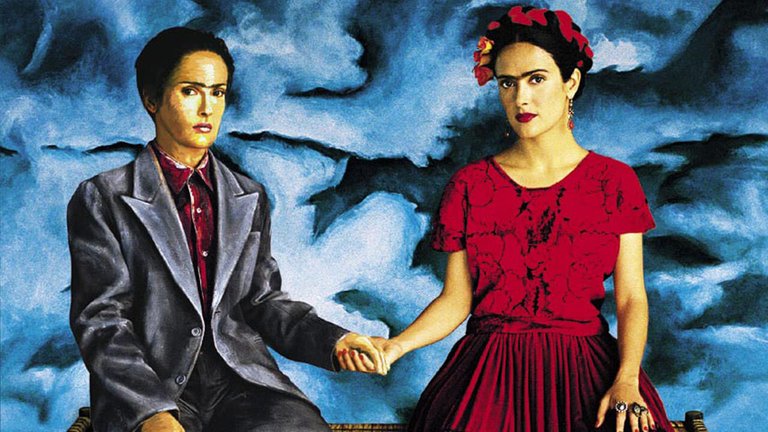Film Review: Frida (2002)

Salma Hayek was one of the very few Mexican telenovela stars to advance to international levels of stardom via Hollywood, but that obviously wasn’t her only career ambition. She has invested a lot of effort to persuade at least some of the great Hollywood studios to start a project she had obviously cared about - a biography of Mexican painter Frida Kahlo (1907-1954), a person who permanently marked the 20th Century art world whose private life was almost as interesting as her paintings. But the idea didn’t look commercial enough to most Hollywood studio executiev, and those who were sympathetic to idea were more keen to entrust the lead role to Jennifer Lopez and Madonna. But Salma Hayek persistence paid off and in 2002 she played the main character in biopic directed by Julie Taymor and titled Frida.
The prologue is set in 1953 when Frida Kahlo (Hayek) prepares to attend her first and the last solo exhibition, and begins to remember key events in his life. Raised in the family of German Jewish immigrant Guillermo Kahla (Rees), she always had artistic ambitions, but her life turned towards art due to horrific traffic accident in 1925, when she was 18 year old. After suffering debilitating injuries, she took three years before being able to walk again and spent the rest of his life being affected by pain and having to go through countless surgical procedures. The pain and humiliation of the the young girl, on the other hand, has reflected in paintings that showed amazing talent. That talent is recognized by Diego de Rivera (Molina), a distinguished Mexican painter, known both for his murals and radical leftist views. De Rivera becomes her mentor and husband, but their relationship will be jeopardised due to De Rivera’s contempt for the bourgeois concepts of marital fidelity. Frida decides to return the favour by having extramarital affairs of her own, often not caring much about gender of her partner. At the same time, de Rivera’s and Kahlo’s political views would embroil the couple into conflict between various factions of Mexican left wing artists and politicians, which escalates when Mexico provides asylum to former Soviet leader Leon Trotsky (played by Geoffrey Rush), now one of Stalin's most bitter opponents. De Rivera considers Trotsky his political idol and gives him refuge, while Frida gives him something even more, which will would lead to tragic consequences.
Most of the audience came to see Frida because of stellar power of Salma Hayek. Critics, on the other hand, were intrigued by Julie Taymor, distinguished stage director who had demonstrated her avant-garde credential with her film debut Titus, unconventional adaptation of Shakespeare’s tragedy. Taymor applies unusual style in this film, and at times combines animation, puppetry and live action to tell the story, often attempting to bring Kahlo’s famous paintings to life. But all that visual splendour can’t hide problems with the script that, like in so many biopics, try to compress someone’s life in series of disconnected episodes, often without broader social, cultural or political context. The only recurring theme appears to be pseudo-feminist deconstruction of the famous couple, in which De Rivera, despite not being that different than Kahlo, is shown as promiscuous male pig, while Kahlo’s promiscuity is portrayed with great deal of sympathy.
Taymor and her screenwriters missed a lot of opportunity to explore broader context of Kahlo’s life. They could have put more emphasis on her position of an outsider in Mexican society – as a Jew and atheist being at odds as predominantly Catholic character of her native countr, just like being independent bisexual woman made her stand out in patriarchal macho culture. Frida all but ignored that dimension of Kahlo’s life and the vibrant left-wing politics of the era was reduced to number of celebrities played by big stars like Antonio Banderas (playing famous painter David Alfaro Siqueiros) and Ashley Judd (playing Italian photographer Tina Modotti). Shoddy treatment of the fascinating story is typified by script ignoring the role of Siqueiros had in spectacular attempt on Trotsky’s life.
General impression of the film is saved by acting. Salma Hayek invested her heart and soul in this project and did everything to bring Frida Kahlo to life again - she let her eyebrows grow just to be as similar as possible to her, and she also interrupted her eight-year moratorium on nude scenes (which was, during Mee Too scandal in 2017, explained by pressure by notorious studio executive Harvey Weinstein). Alfred Molina, in turn, didn’t really bother too much. He made character of the obese painter look too cute, but despite that he still gives the impression that the film could have been far more interesting if titled *Diego?. Geoffrey Rush is, in turn, quite effective in the role of Trotsky, showing far better handling of Russian accent than is the case with most actors from the English-speaking area. The result of all this is pleasant to the eye and, at times, rather impressive work that will satisfy all viewers looking for an alternative to Hollywood mainstream, but which still gives too many hints that it could have been far better.
RATING: 5/10 (++)
Blog in Croatian https://draxblog.com
Blog in English https://draxreview.wordpress.com/
Leofinance blog https://leofinance.io/@drax.leo
Unstoppable Domains: https://unstoppabledomains.com/?ref=3fc23fc42c1b417
Hiveonboard: https://hiveonboard.com?ref=drax y
Bitcoin Lightning HIVE donations: https://v4v.app/v1/lnurlp/qrcode/drax
Rising Star game: https://www.risingstargame.com?referrer=drax
1Inch: https://1inch.exchange/#/r/0x83823d8CCB74F828148258BB4457642124b1328e
BTC donations: 1EWxiMiP6iiG9rger3NuUSd6HByaxQWafG
ETH donations: 0xB305F144323b99e6f8b1d66f5D7DE78B498C32A7
Posted using CineTV